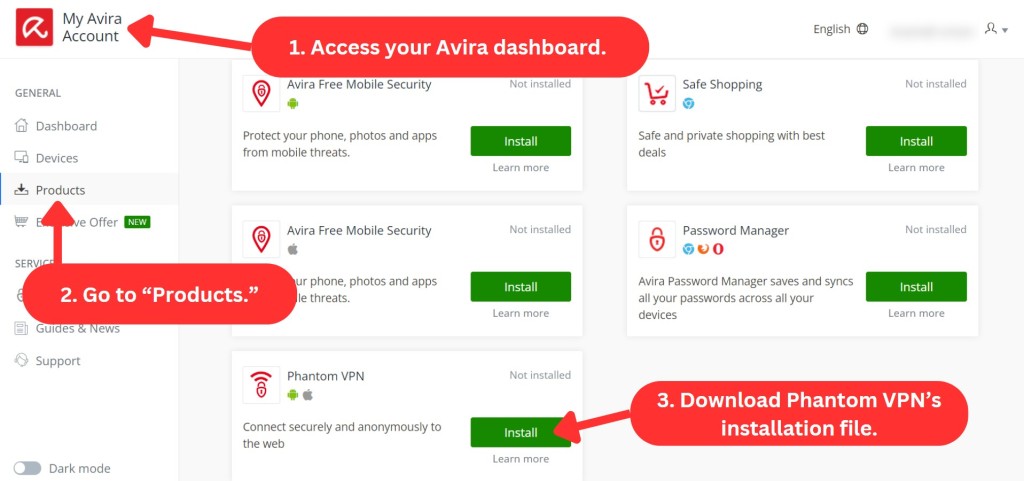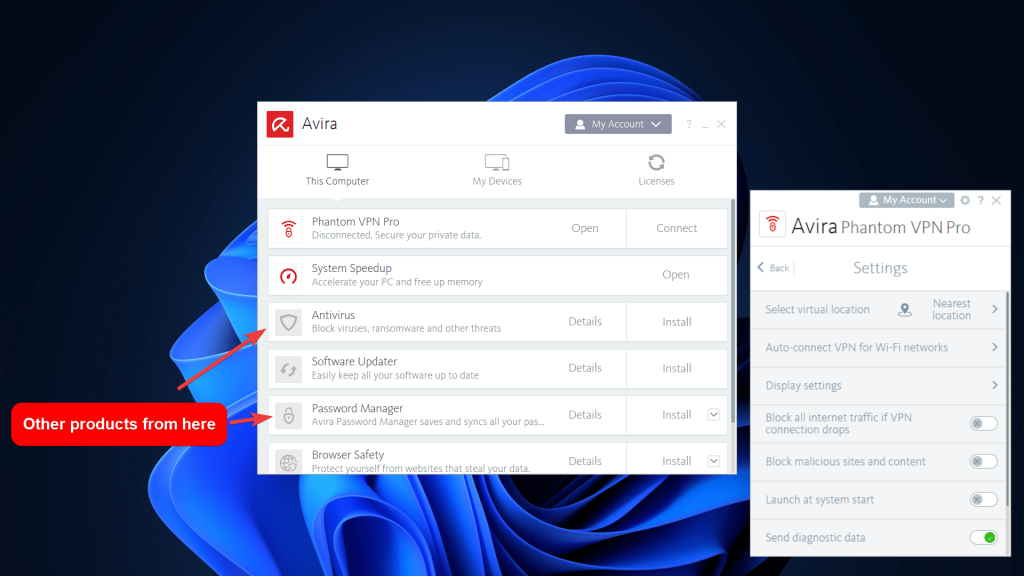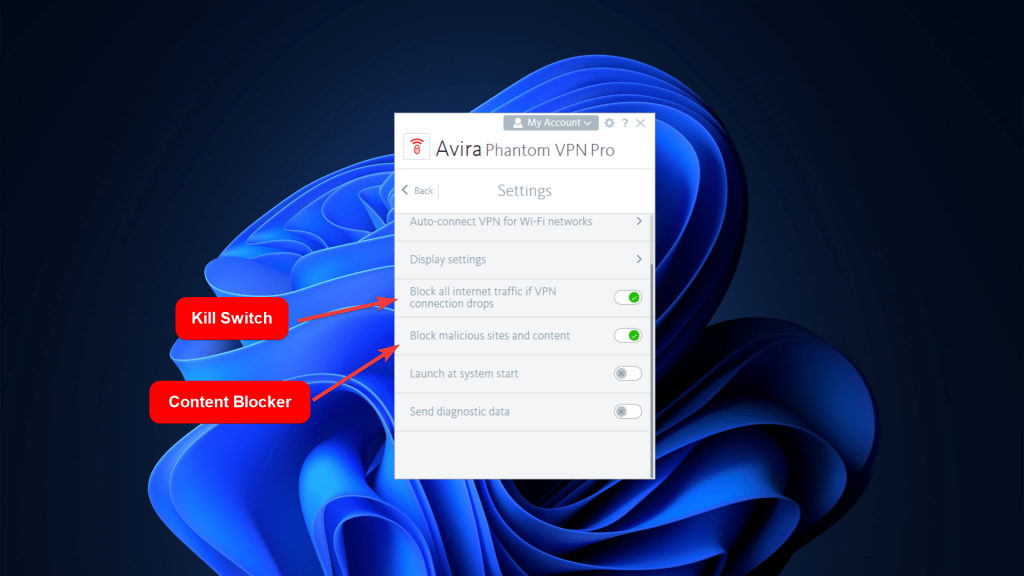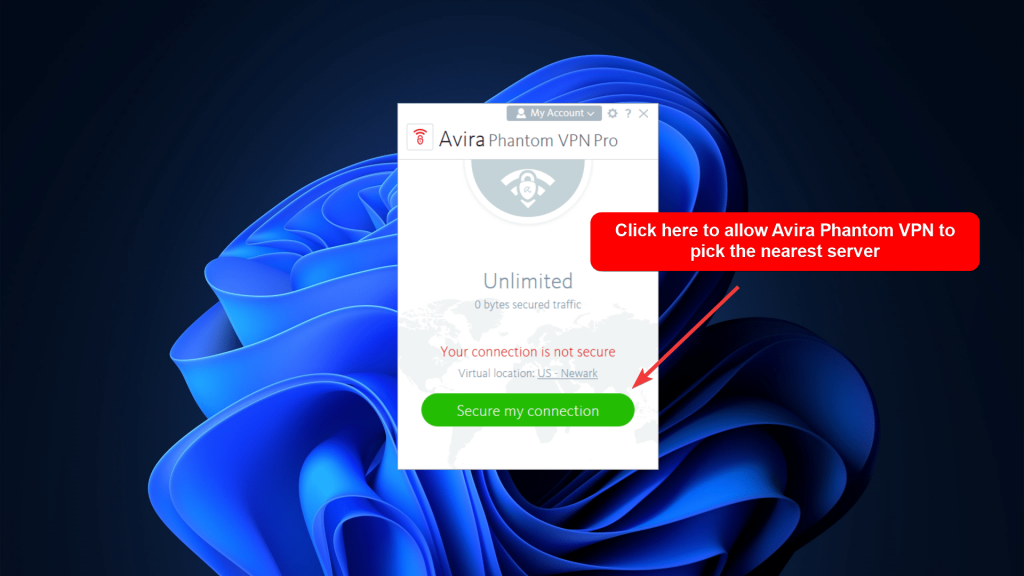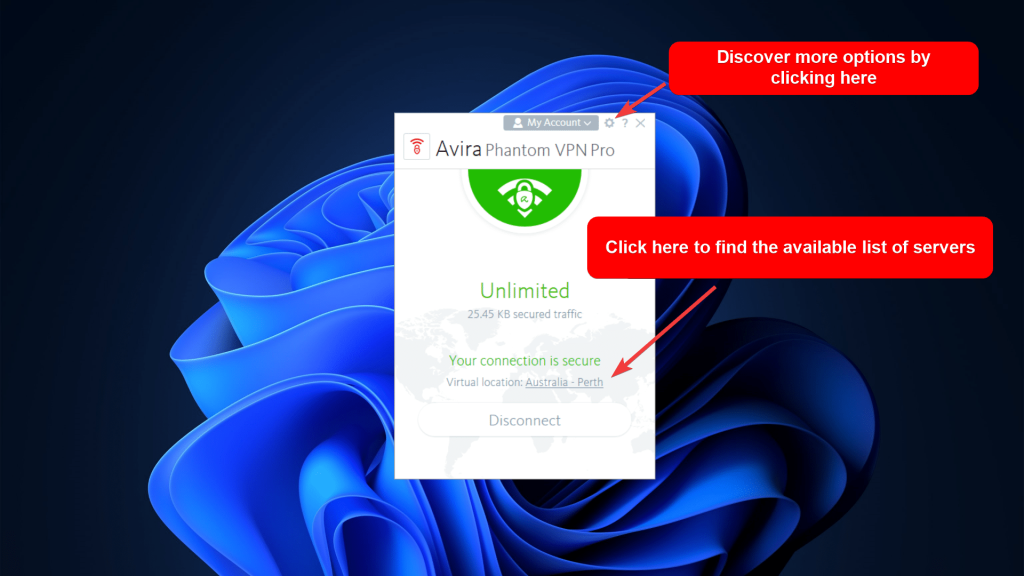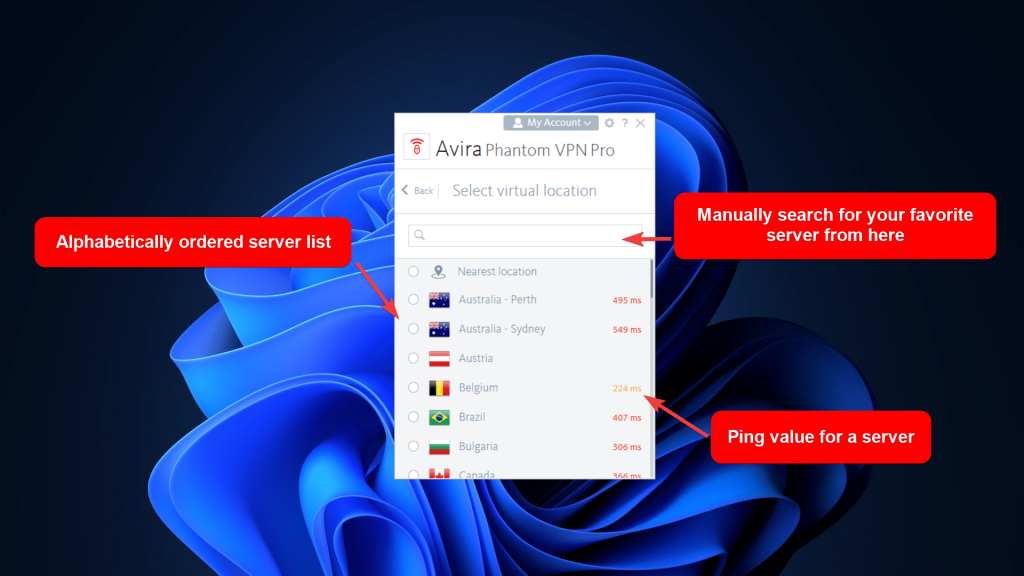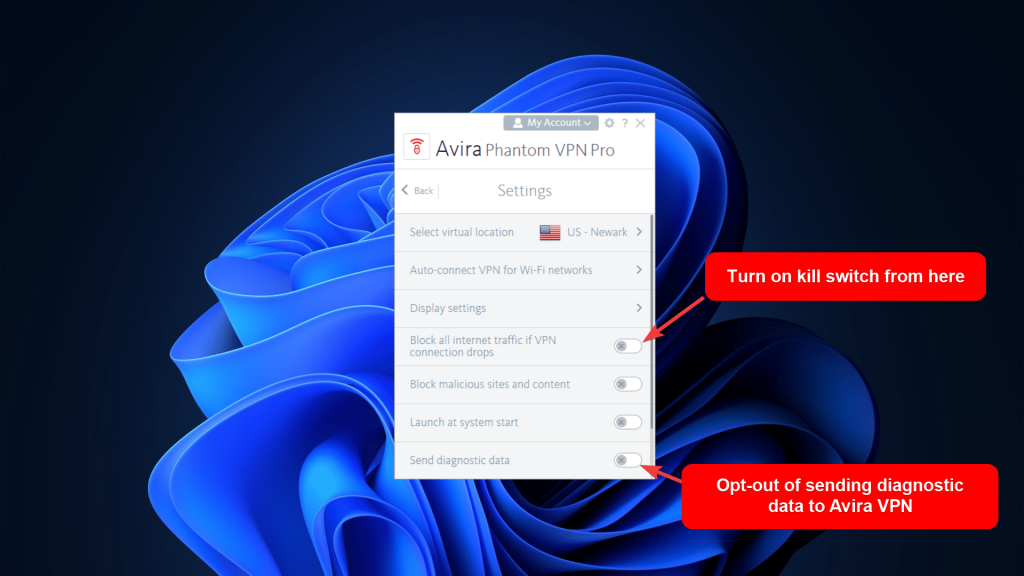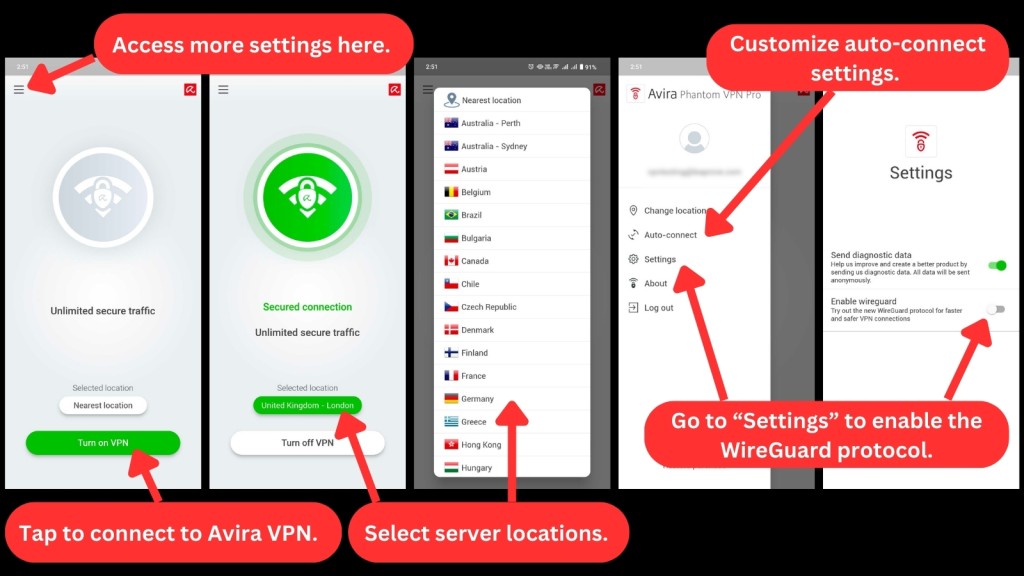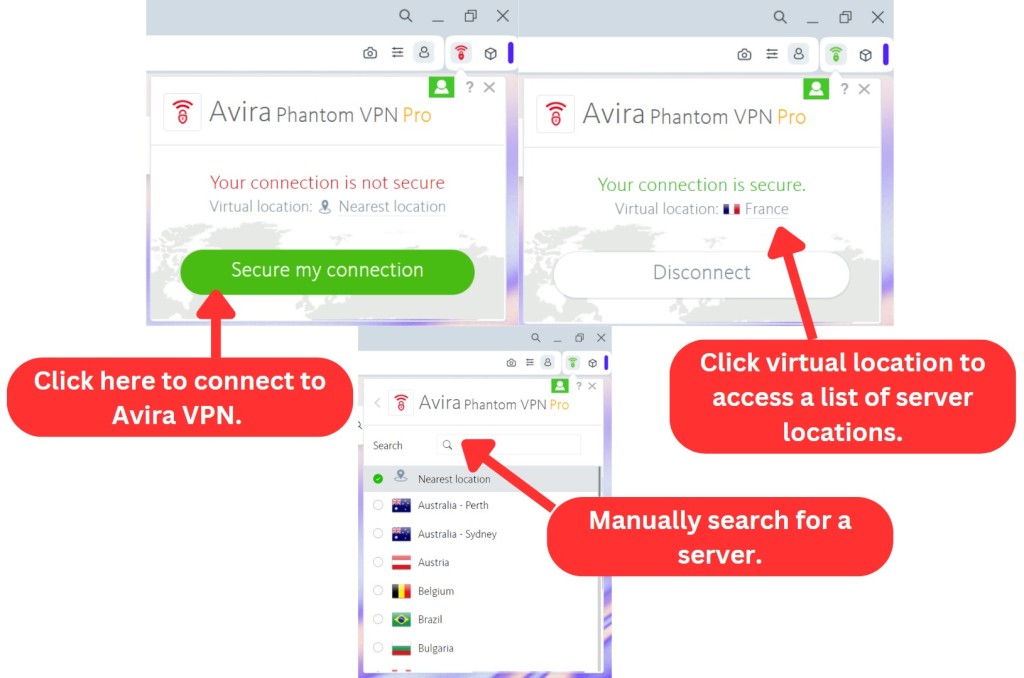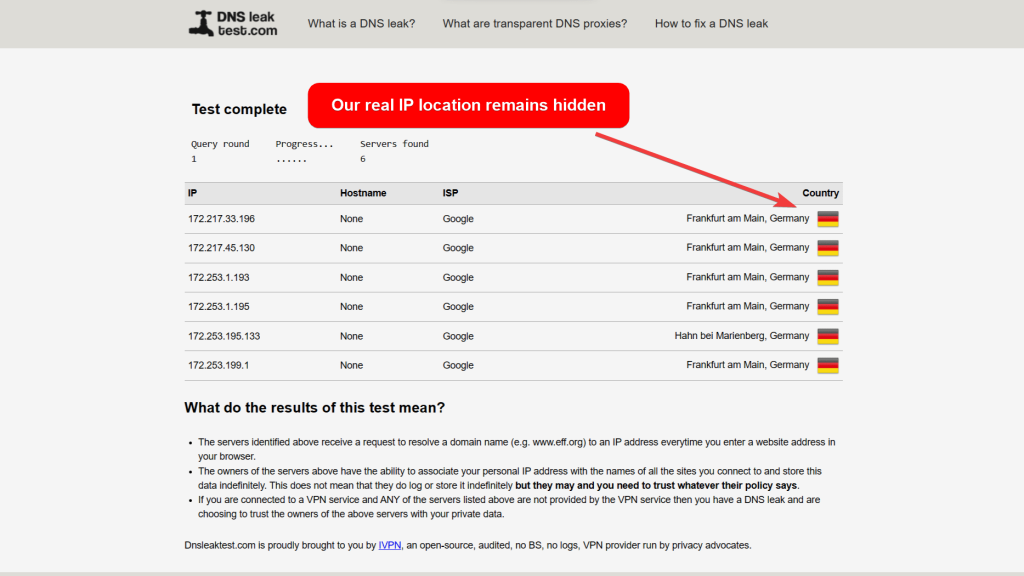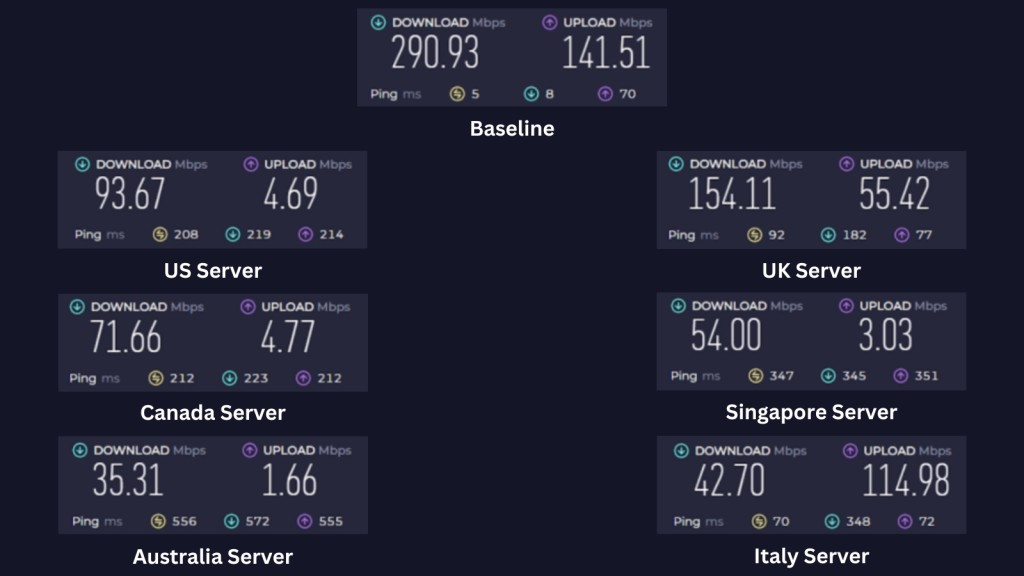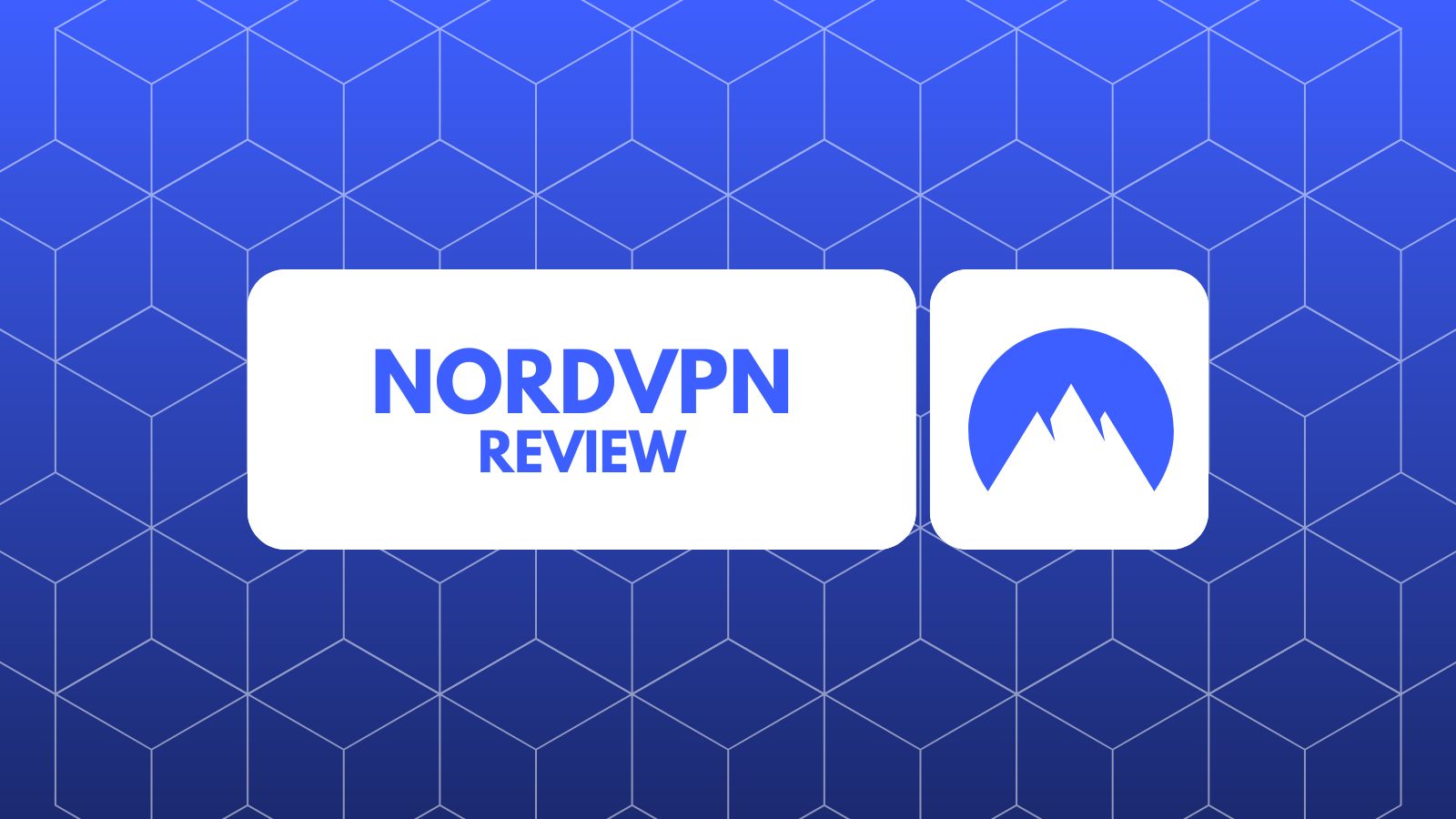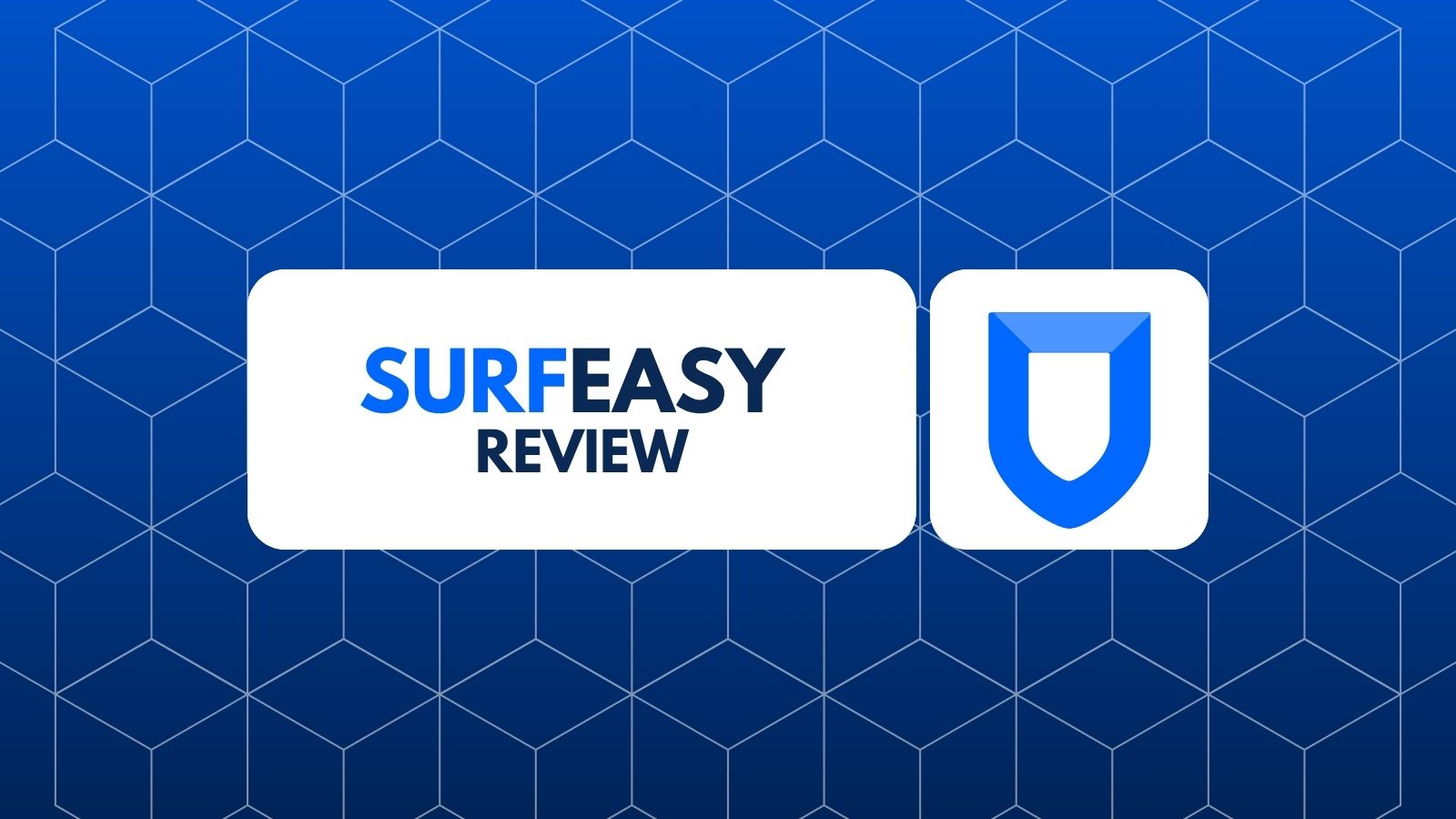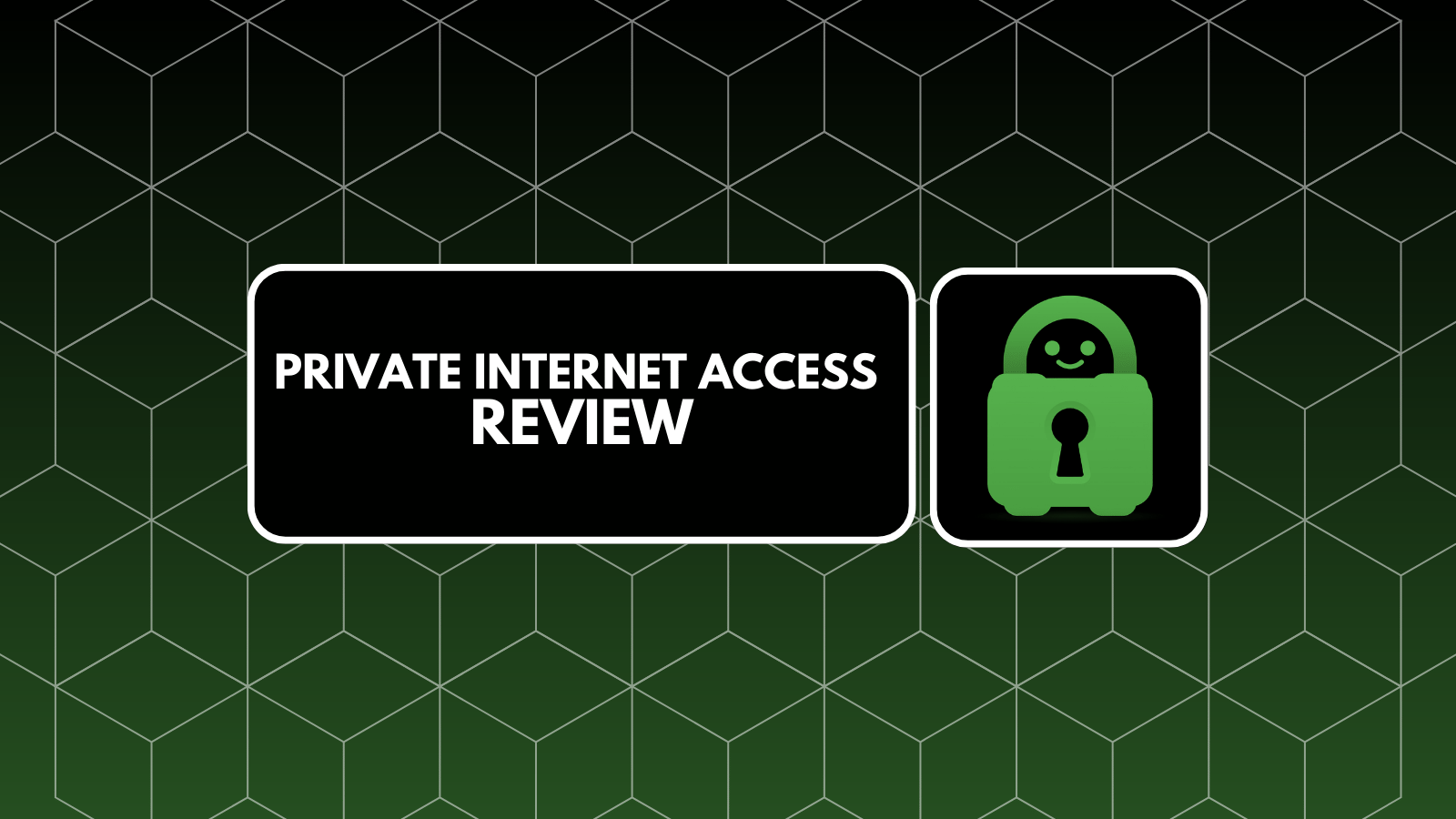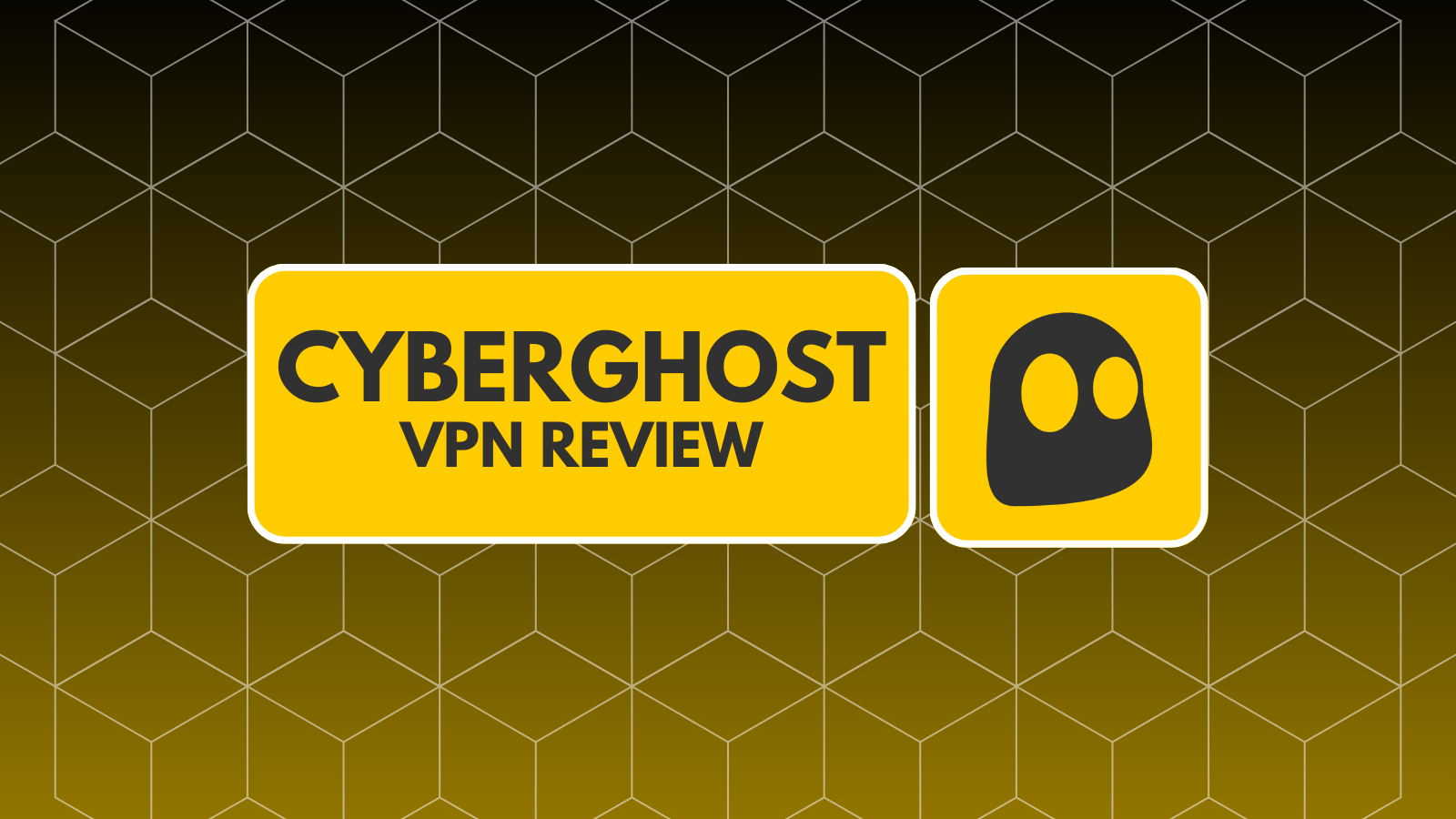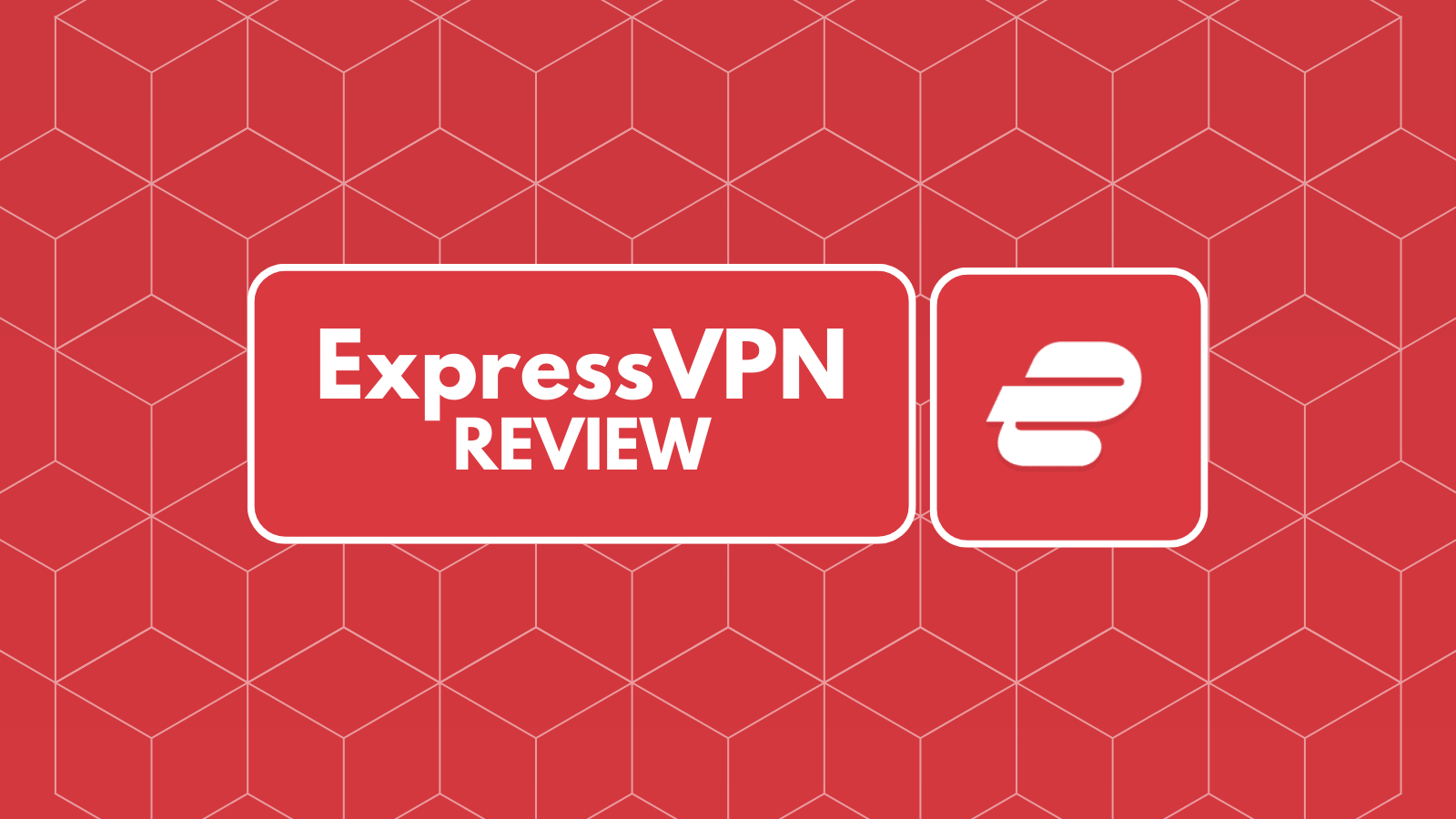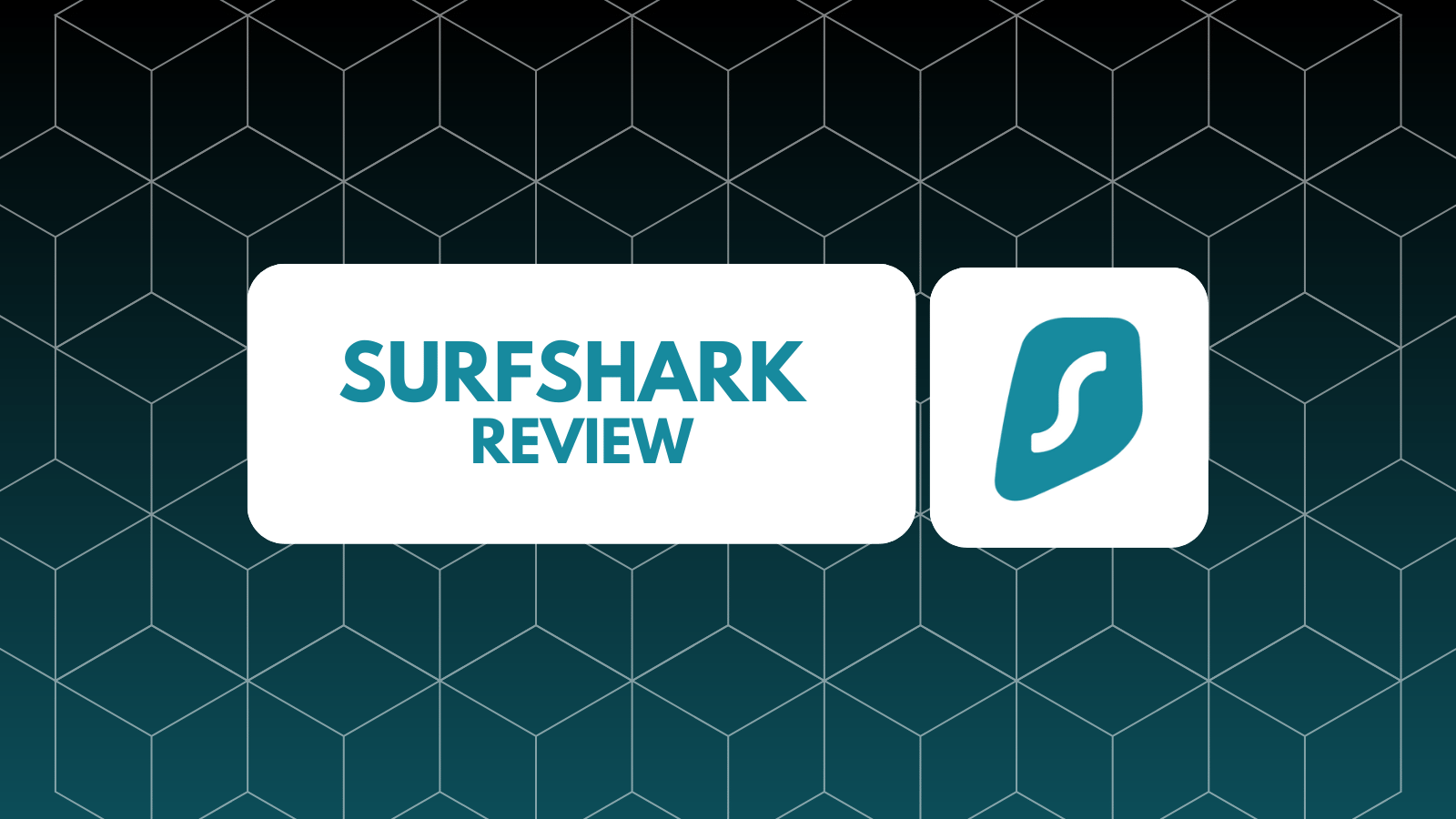When you purchase through links on our site, we may earn an affiliate commission. Here’s how it works.
Avira Phantom VPN Review 2025 (Free & Pro)
Our experts have reviewed 53 VPN providers, which were put through extensive rounds of testing. To learn more about that process, here’s how we review VPNs, where we explain our criteria and our policy of being fully transparent.
This VPN service is offered by Avira, a well-known German cyber security company. That said, one of the concerns regarding Avira Phantom VPN is that it’s based in Germany, which is part of the 14 Eyes Alliance. Additionally, its parent company, Gen Digital, operates in the US and is also part of the alliance. However, its robust encryption and no-logs policy should reassure users that their data is secure.
Another concern about the service is that it has servers in only 36 countries, which may not be ideal for some users. Its connection speeds are also slow, making it difficult for media streaming, torrenting files, and playing games. Also, the VPN doesn’t support DNS settings for routers or consoles, which could limit gaming options.
Overall, we found that Avira VPN offers all the basic privacy and security features, although it does lack some of the advanced features that other VPNs may offer in the same price range.
We intend to help you decide if Avira Phantom VPN is the right pick. To do that, we’ll examine its performance and features. Let’s start with the table below that shows all its main features.
This Avira Phantom VPN review will evaluate Avira Phantom against the best VPN services using various tests and criteria. We’ll assess its reputation, speed, security, privacy, pricing, and customer support.
We have an unbiased approach to our reviews to ensure fairness and accuracy. If you’re interested in understanding how we conduct our reviews, we have an article that explains how we review VPNs.
Background, Jurisdiction & Reputation
Avira is based in Germany, with headquarters in the USA. Its jurisdiction may be a concern for some, but there have been no reported data leaks so far. Our Score: 8/10
It’s important to know where your chosen VPN comes from, as these online services (just like any other type of business organization) must respect the laws of their home country. So, let’s see where Avira comes from and what that means for its users.
Where Is Avira Phantom VPN Based?
Avira VPN is based in Germany. "Avira" was previously known as H+BEDV Datentechnik GmbH, established in 1986. With over 100 million users worldwide, Avira offers products that combat malware and various digital threats.
The company has offices in Romania, the Netherlands, China, and the United States. That said, the Avira headquarters nearest to your location will determine the laws that govern your software use. Unless you’re in North America, purchasing a VPN from Avira will fall under the jurisdiction of Germany, which is one of the leading members of the European Union.
On the one hand, Germany has strict and rigorous laws regarding data protection and the way companies log your personal information. As an example of this, the EU fined Google for GDPR privacy violations not too long ago, and the same thing happened in France as well.
On the other hand, Germany is a member of the 14 Eyes Alliance, founded by the USA, Canada, Australia, New Zealand, and the UK. This means that 14 countries can easily access your personal data if there’s a justifiable reason to believe that you’re breaking any laws.
When it comes to using Avira Phantom VPN Pro in North America - here's the deal - the laws of the United States apply to you. That said, the country is all about data logging and mass surveillance, which is why the best VPNs are based in countries like Panama, Dominica, Seychelles, and the British Virgin Islands. These places are well out of reach for the 14-Eyes Alliance.
Now, here's something interesting. In December 2020, Norton LifeLock (now Gen Digital or simply Gen) acquired Avira. Gen Digital has its headquarters in the U.S. and acts as the parent company for Norton, LifeLock, Avast, AVG, Avira, and CCleaner.
Several brands under Gen Digital also have their owns VPNs, like Avast SecureLine, Norton Secure VPN, HMA, and SurfEasy. This might have some folks worried about changes to the VPN's policies and services. But as far as we can tell, Avira is still sticking to its core values and providing reliable VPN services to its users.
Did Avira Phantom VPN Leak Personal Data in the Past?
No, Avira Phantom has had no leaks of personal data in the past. There have been no reports of data breaches or Avira sharing personal data with third parties. This shows their dedication to their privacy policy.
However, it's worth noting that if a government requests data, Avira can only report what it has on record. Since the VPN has a no-logs policy, Avira will have nothing to disclose.
While this may be reassuring, it's important to keep in mind that there's always a risk of government intervention, especially if you're in a country with strict data retention laws.
Is Avira Phantom Pro VPN Safe?
Yes, Phantom Pro VPN is pretty safe. More precisely, this service is known for its robust security features that ensure users' online privacy and data protection.
Its strong AES-256 encryption and OpenVPN and IPSec protocols provide reliable protection against online threats. Moreover, the service implements a strict no-logs policy and a kill switch feature to prevent any leaks, ensuring that users' data remains secure and private. But keep in mind that the service hasn't been audited by a third party to confirm its claims.
That said, the company makes it clear that it will comply with data requests from public authorities. However, as the service doesn't store any identifiable information, it can't hand over any such data.
Supported Platforms & Devices
Avira Phantom meets the needs of non-demanding Windows and Mac users. It's accessible on mobile devices and even offers an Opera extension. However, you can’t install it on routers or media streaming devices. Our Score: 4/10
A single VPN subscription usually lets you protect several devices simultaneously. And when it comes to Avira Phantom VPN Pro, you get unlimited, simultaneous connections. So, let’s see below which devices are supported by this VPN.
Avira Phantom VPN provides coverage for some of the most popular platforms, like Windows PC, macOS, Android, and iOS. As per their official website, they offer a Chrome extension. However, when we checked, only the Opera browser extension proved functional. Unfortunately, there's also no support for Linux devices, media streamers, or routers.
Although a single subscription supports unlimited devices, the absence of router support and a Smart DNS solution makes it challenging to use Avira VPN on devices that don't natively support VPN apps.
It's also important to note that while the browser extension is an excellent way to mask your IP address, even on Linux devices, it only secures the browser traffic and isn’t a complete substitute for the desktop VPN app.
Overall, Avira Phantom VPN is a decent choice for non-demanding home users looking to secure their computers, smartphones, and tablets, but it may not be suitable for those who require more extensive device coverage.
Installation & Initial Configuration
The process of installing Avira Phantom is simple. However, you’ll also end up with software that acts as a marketing channel for the company. Our Score: 4/10
To learn how to use Avira VPN, you must first subscribe to Avira Phantom VPN Pro by creating a user account and going through the payment process.
After subscribing, you can log in to your account on the official Avira site, which provides a well-designed control panel that displays all the information about its free and paid services. Through the control panel, Avira promotes its free tools, such as antivirus, password manager, system speedup tools, and more.
The installation process is straightforward. You can download the installer for your device, double-click on the installation file, and go through the general steps.
Interestingly, the VPN app comes with another app that promotes other Avira products and security tools like antivirus protection. This can be a bit bothersome. However, it also aligns with industry norms, particularly among companies specializing in antivirus software. While this marketing push is acceptable for the VPN’s free tier, it’s less appropriate for the Pro version that you pay for.
Now that Avira is with NortonLifeLock (Gen Digital), it follows the rules set by the U.S. about trade restrictions. Unfortunately, customers in certain countries can't use Avira products or get support. These countries include Cuba, Iran, North Korea, Sudan, Syria, Russia, Belarus, and the Crimea region of Ukraine (controlled by Russia).
So, if you're having trouble buying or installing Avira, it might be because you're in one of these countries under an embargo. Additionally, Avira's VPN service isn’t available in India due to a new mandate requiring data logging.
Prominent Features
Aside from the standard set of features, Avira Phantom VPN Pro comes with a kill switch. However, anti-malware, split-tunneling, and other high-end features are missing. Our Score: 6/10
You must be wondering what kinds of features this VPN provides. Well, let’s take a close look at the basic and more advanced features Avira Phantom VPN offers.
Now that we have an overview of the service’s features, let’s take a closer look at them one by one:
- DNS and IPv6 Leak Protection: Avira provides protection against DNS leaks by using its own DNS servers. It also has built-in IPv6 leak protection. However, unlike some top providers, it does not offer protection against WebRTC leaks.
- AES-256 Encryption: This military-grade encryption is widely considered to be unbreakable and highly secure. This level of encryption ensures your data is protected from hacking and other cyber threats, no matter what you're doing online.
- Kill Switch (Windows Only): Avira VPN's kill switch is a crucial feature that helps to maintain your online privacy, even if your VPN connection drops unexpectedly. It works by immediately blocking your Internet traffic if the VPN connection is lost, so your real IP address and location remain hidden from prying eyes.
- Malicious Site and Content Blocking: This feature scans URLs against a database of known harmful sites. If a match is found, access to the site is blocked, and a warning message is displayed.
- VPN Protocols: Phantom VPN uses OpenVPN as its default protocol for all its native VPN software, except for the iOS app, which uses IKEv2. Both OpenVPN and IKEv2 are popular and widely used VPN protocols that offer high security and performance.
- Unlimited Server Switches and Bandwidth: With this service, users can access any server they want without paying extra or facing restrictions. Avira Phantom VPN also offers unlimited data usage, so users can enjoy the VPN service for as long as they need.
Although the Avira Phantom VPN has a decent set of features, it falls short in terms of advanced privacy settings, like a split-tunneling feature, compared to other top-tier players. On top of that, it lacks other useful features like port forwarding and dedicated IPs.
Its settings panel also offers basic options with limited fine-tuning. So, if you're seeking more advanced privacy options, you may need to look elsewhere.
Server Count & Infrastructure
Avira Phantom VPN has a limited server network, as it’s available in 36 countries only. When compared to the highest-rated VPNs, Avira falls way behind in terms of server coverage. Our Score: 5.5/10
You need to know how many servers you’ll get and whether there are nearby servers that could bring throttle-free speeds. Here’s the server count info for Avira Phantom VPN Pro.
According to their product website, Avira VPN has 1,400 servers in 37 countries. However, we were only able to find 36 countries through the app. Compared to VPNs with the most servers, Avira Phantom falls behind.
Its server coverage is strongest in Europe, with more than 20 server locations. In Asia, there are only 4 server locations, and only 2 in South America, Chile, and Brazil. There are no servers in Africa.
Out of all of those, only 3 countries offer city-level selection: Australia (Melbourne and Sydney), the United Kingdom (London and Manchester), and the US, under which you can choose 12 different cities plus one optimized server for streaming.
Another important thing to note is that Avira VPN doesn't have any physical servers, as all their servers are virtual.
UI/UX Design & Ease of Use
Avira Phantom comes with a simple UI suitable for average home users. More advanced users will be left wanting additional options and in-depth tweaking. Our Score: 5/10
During our testing, we didn’t encounter any major problems with Avira Phantom VPN’s UI design. However, users looking for a modern and visually appealing interface may want to consider other options, as this one could surely use some upgrades.
In this review, we've used the Windows app, and as soon as you launch it, you'll notice its straightforward design. The interface is super easy to navigate, thanks to its minimalistic appearance with just a few buttons.
To kickstart your VPN connection, simply click on the green button labeled "Secure my connection." Right above it, you'll find the option to change the virtual location, giving you access to a list of servers.
While the home screen doesn't offer much else to explore, you can find additional VPN options by clicking on the cogwheel button in the upper right corner of the app. That said, let’s take a closer look at what this VPN service has to offer.
- Servers: You can choose a server by clicking on any of the countries listed in the available server list, searching for a server manually, or selecting the nearest location. Additionally, you'll see the ping values for all servers, which indicate the distance between you and the servers that Avira offers. Once you've made your pick, click on the country, and the VPN will automatically connect you.
- Settings Menu: At the top of the UI, you'll find a settings button that will take you to the application's settings panel. Here, you'll find several options, such as the server list, the option to enable Avira Phantom on specific Wi-Fi networks, and the option to open the application on start-up. You can also enable or disable the application's kill switch and content block tool. Additionally, you can choose the app's theme. That's pretty much all there is to it.
The Android and iOS apps share a minimalist design, perfect for those new to VPNs. However, incorporating crucial features like a kill switch and split tunneling into the mobile apps could improve the user experience.
While both mobile apps offer the same look and features, an interesting difference emerges – the Android version allows you to choose WireGuard as a VPN protocol, a feature absent in the iOS counterpart.
When it comes to browser extensions, Avira VPN claims on their website that they provide extensions for Chrome. However, after checking, we found that only the Opera extension worked as intended. Unfortunately, their download link for the Chrome extension is broken, and we couldn't find the extension on the Chrome Web Store.
As you can see from the image above, the Opera extension doesn't offer the same range of functionalities as the desktop and mobile apps. While the Pro version offers more servers, the free version limits you to connecting to only four server locations. While it serves as a decent and basic add-on, this limitation might be a factor to consider.
To complement the features discussed earlier, Avira Phantom VPN offers a Web-based control panel that you can access through the 'My Account' button located at the top right of the UI. There's also a question mark button that takes you to the support page on Avira's website.
Overall, Avira Phantom VPN offers a user-friendly experience with basic features, making it suitable for average home users. However, it may not satisfy the needs of more advanced users seeking a more customizable solution.
Media Streaming, Torrenting, and Gaming Support
When it comes to media streaming, this VPN seems less than ideal. It can't unblock most popular streaming sites, exhibits sluggish performance with torrenting, and doesn't extend support for gaming. Our Score: 4/10
VPNs offer a range of advantages, from unblocking websites to enabling torrent downloads and ensuring secure, lag-free gaming. However, not every VPN excels in all of these areas. Our Avira VPN review explores how it performs in these crucial aspects. Here's what we discovered.
Is Avira Phantom VPN Good for Streaming?
No, Avira Phantom isn't a good VPN for streaming. While we've successfully unblocked Netflix US using its US-based server optimized for streaming, the connection was really slow. This made unblocking other streaming platforms like Hulu, Amazon Prime Video, Max, and BBC iPlayer challenging.
Despite these challenges, we went ahead and tested it on various streaming platforms. Check out the table below to see how Avira VPN did.
If you're aiming to unblock geo-restricted content, this service might not cut it. For smooth access to your paid streaming services while traveling, you'd be better off with a VPN like NordVPN, which brings better unblocking and faster speeds compared to what Avira Phantom can deliver.
Is Avira Phantom VPN Good for Torrenting?
No, Avira Phantom isn't good for torrenting. While the Pro version has servers optimized for P2P sharing via uTorrent and BitTorrent clients, the speed was disappointingly slow in our torrent tests. Torrenting with Avira VPN's free version is also a no-go due to limited data and the absence of a reliable kill switch.
Additionally, although Avira Phantom Pro supports P2P sharing, downloading illegal files isn't advisable, given the strict copyright protection laws in the USA and Germany. Even though torrenting is legal and allowed in most countries, downloading copyrighted files may not be. Therefore, knowing your country's laws is crucial before hitting that download button.
Another downside is that this VPN lacks some beneficial features for torrenting, such as port forwarding and SOCKS5 proxy. Having these could've significantly improved its speed. If you're into torrenting, considering the best VPN for torrent would be a wise choice.
Is Avira Phantom VPN Good for Gaming?
No, Avira Phantom isn't good for gaming. It doesn't offer gaming-optimized servers, so its sluggish speeds led to frustrating lags, disrupting our gameplay. While connecting to a nearby server improved things slightly, it still struggled with unblocking geo-blocked game lobbies.
Another drawback is that Avira Phantom lacks a smart DNS solution and doesn't support routers. As a result, it's not easy to use Avira VPN on devices that don't have native VPN apps, such as gaming consoles. Even for gaming PCs, the performance was below average. If you want a high-performing gaming VPN, far better choices exist.
Security & Privacy
We're happy to say that your online activities are in good hands with Avira Phantom VPN. It safeguards your privacy through advanced protocols, a strict logging policy, and effective leak prevention. Our Score: 6/10
In this section, we assess Avira VPN's trustworthiness with your data, looking at its VPN protocols, logging policy, and possible IP/DNS leaks. These will shed light on how our private data is handled.
Avira Phantom VPN Protocols
In terms of encryption, Avira VPN uses AES-256, the strongest commercially available encryption. Even if someone gains access to your encrypted data, it would take many years for them to actually ‘read’ it.
Avira Phantom offers two VPN protocols - OpenVPN and IPSec. However, the availability of these protocols varies based on the platform you’re using. Refer to the table below for a summary of which protocols are available on which platforms.
- OpenVPN: OpenVPN is the default protocol used by Avira Phantom VPN, except on iOS. You can connect to Avira Phantom VPN servers from any device that supports OpenVPN, including Windows, macOS, and Android. It encrypts your data, protects your IP address, and ensures anonymous browsing.
- IPSec: Avira Phantom VPN uses the IPSec protocol for iOS devices and applications from the AppStore and Microsoft Store. IPSec creates a secure tunnel between your device and a VPN server, encrypting your data with a key that only you and the server can access. It also verifies the identity of both parties, preventing tampering or replay attacks.
Although the protocol selection of Avira Phantom VPN may not be extensive, it still provides sufficient security and privacy options for its users. It’s important to mention that having fewer protocol options can be a drawback if you encounter a slow server.
Does Avira Phantom VPN Keep Logs?
No, Avira Phantom VPN doesn’t keep logs of any trackable data. The privacy policy of this VPN is easy to understand and clearly explains the types of data collected. The collected diagnostic data, which helps Avira resolve performance issues and bugs, can be disabled within the application.
Avira only collects the total amount of bandwidth consumed, the amount of time a user is online, and whether the account is free or premium. Avira doesn’t log or monitor your browsing activity, IP address, or the VPN server you connect to. This means it can’t track your online activity back to you. Avira also keeps track of your membership to calculate the costs.
It's worth mentioning that this VPN doesn’t collect your browsing history, IP address, or any other action that could link you to downloading a certain file or visiting a particular website.
With all this information, it seems Avira Phantom VPN does have a strict no-logs policy. However, it hasn't been independently audited. It would be great to see an audited policy in the future.
Does Avira Phantom VPN Leak/Expose Your Private Data?
No, Avira Phantom VPN doesn’t leak your private data. Upon conducting a DNS leak test while using Avira Phantom VPN, it was clear that no leaks were detected.
This is a positive sign that once the VPN is activated and connected to a server, all user data becomes encrypted and secure. As a result, third parties will only have access to virtual information, such as a virtual IP address, hostname, ISP, and country of origin, while original user data remains protected.
Speed & Performance
Avira Phantom is miles behind its competitors in terms of speed and performance. We tested nearby and remote servers, and all of them delivered slower-than-expected performance. Our Score: 4/10
We’ve assessed Avira Phantom VPN’s performance by connecting to nearby and remote servers using its default protocol. In this segment of the review, we’ll reveal the results of those tests, giving you a clear indication of what to expect in terms of Avira Phantom’s performance.
Before we connected to Avira Phantom’s servers, we tested our baseline speed. As you can see above, we’re on a 300 Mbps connection. More precisely, our baseline speed tests showed 290.93 Mbps for downloads and 141.51 Mbps for uploads. Now, let’s check Avira Phantom’s performance:
- US Server: Once we entered the territory of remote servers, Avira Phantom VPN started to show its weaknesses more prominently. Its US-based server gave us 93.67 Mbps for downloads and only 4.69 Mbps for uploads.
- UK Server: Avira’s UK server performed better than the previously tested one (Italy). We got 154.11 Mbps for downloads and 55.42 Mbps for uploads. Our download speed was cut by around 50%. However, our upload speed deteriorated even further.
- Canada Server: Avira’s Canadian server performed similarly to the one in the United States. We ended up with 71.66 Mbps for downloads and 4.77 Mbps for uploads. In comparison to the US server, our download speed decreased slightly while our upload speed remained the same.
- Singapore Server: We usually test Indian servers in this round, but Avira Phantom VPN no longer offers that option. So, we picked a server in Singapore, which gave us 54.00 Mbps for downloads and 3.03 Mbps for uploads.
- Australia Server: Finally, Avira Phantom’s Australian server is practically on the other side of the world relative to our location. So, we expected to see the lowest numbers yet - and that’s exactly what happened. We got 35.31 Mbps for downloads and 1.66 Mbps for uploads.
- Italy Server: Relative to our location, a server in Italy presents a nearby connection. We expected to see minimal throttling, but that didn’t happen. Our speed tests showed that we ended up with 42.70 Mbps for downloads and 114.98 Mbps for uploads. That’s a very noticeable slowdown.
We conclude that Avira Phantom VPN made our connection slower by 74% on average. As you can imagine, that’s a pretty disappointing result overall. On top of that, this VPN doesn’t allow you to fine-tune the parameters of your VPN tunnel or connection, which means there’s little you can do to improve its performance.
Customer Support
Avira has quick and professional live chat, email, and phone support. It also offers an extensive knowledge base for customers, but its chatbot isn’t very helpful. Our Score: 8/10
Since VPNs are premium-priced solutions, it’s important to know what kind of support you’ll be getting for your money. That said, here's what you could expect from Avira’s online support resources:
- Live Chat: Avira offers a convenient live chat feature that lets you connect directly with their customer support team. You can access this feature by clicking on the chat box icon located at the bottom right corner of the website. This feature is available 24/7 and supports multiple languages, making it easy for users to get their queries resolved quickly and efficiently.
- Knowledge Base: Avira has an extensive knowledge base that covers a range of topics related to their VPN. This section includes answers to questions related to downloading and installing the software, activating your license, troubleshooting, and more. Through them, users can easily find the answers they’re looking for without having to contact customer support.
- Email & Telephone Support: Avira Phantom VPN exclusively offers this type of support to paid users. It allows users to contact the customer service team via email or phone during business hours. It’s a useful resource for users who may have specific questions or technical issues that aren’t covered in the knowledge base section.
- Community Support: This is a community forum where you can ask fellow users for help and guidance. It's a platform where the community comes together to share insights, solutions, and tips regarding Avira VPN.
Unfortunately, Avira Phantom VPN only provides personalized customer support for its paying users. This implies that those who aren’t paying, including potential customers, are unable to take advantage of it. In general, we anticipated more inclusive customer support from Avira.
Pricing
Avira Phantom VPN provides a cost-effective pricing plan with its annual subscription, enabling you to save up to 35%. This brings the monthly price down to $6.50. Our Score: 4.5/10
Since Avira has two headquarters (in the USA and Germany), you’ll see two pricing plans, depending on where you come from. Here, we’ll focus on the pricing plans applicable to North America.
How Much Is Avira Phantom VPN Pro?
The lowest you can pay for Avira Phantom VPN Pro is $4.99 per month, which is the price of its mobile monthly plan. Here are more details:
- 1-Month Plan: Avira Phantom VPN Pro's monthly subscription costs $10. If you're only looking for a short-term VPN solution, this may not be the most cost-effective option for you.
- 12-Month Plan: Avira Phantom VPN Pro offers a 35% discount on the 12-month plan, reducing the cost to $6.50 per month. While this plan requires an upfront payment of $78.00, it’s still reasonably priced compared to the industry average.
- Mobile – Monthly Plan: If you only need a VPN for your mobile devices, you can opt for the mobile-only plan at a cost of $4.99 per month. Although this plan is affordable, it limits your VPN access to only your smartphone. Nonetheless, you can use it across an unlimited number of iOS and Android devices.
You can subscribe to Avira Phantom VPN Pro and use it on any number of devices, including computers, smartphones, and tablets. The annual plan, priced at $6.50 per month, allows you to save 35% on the subscription. Although the mobile-only plan for Android and iOS devices only costs $4.99 per month, it doesn’t offer an annual counterpart.
Avira accepts credit or debit cards and PayPal as payment methods, but anonymous payment options aren’t available. The 60-day money-back guarantee applies to annual subscriptions, giving you a generous two-month window for a change of heart. On the other hand, for monthly subscriptions, there's a 14-day money-back guarantee, but this only covers the first month.
Is Avira Phantom VPN Free?
Yes, there's a free Avira Phantom VPN available. While it's a reliable option and comes with a strong privacy policy similar to the paid version, there are some drawbacks to keep in mind.
For instance, it's unusable for streaming or torrenting as it comes with a 500 MB monthly data limit. However, registering with your email doubles that limit to 1 GB per month.
Despite offering only one server, it does permit P2P traffic. Additionally, there's a 7-day trial for the Pro version exclusively for mobile devices. This option is perfect if you're looking to experience a free trial without any data caps.
With all the limitations, it’s still a decent option for users who prioritize privacy and don't consume too much data.
Final Thoughts - Is Avira a Good VPN?
No, Avira isn't considered a good VPN. While it offers some basic features and unlimited simultaneous devices, it lacks in speed, server locations, and advanced features compared to more reputable providers.
It also struggles with geo-restrictions, so it's not a suitable option for travelers or users located in high-censorship nations such as China. Moreover, the standard monthly subscription comes with a relatively high cost for the limited features it brings to the table.
The silver lining is that, in our experience, Avira VPN ensures a secure connection without any leaks. Overall, Avira VPN might be an acceptable choice for VPN beginners seeking basic online privacy and data security. For a more comprehensive and dependable VPN experience, we strongly recommend NordVPN.
PROS
- Protects your privacy.
- Easy to use.
- Has a free version.
- Free 7-day trial on mobile plans.
- Offers refunds up to 60 days.
- No IP/DNS leaks.
- Unlimited device connections.
CONS
- Apps lack advanced settings.
- Struggles in bypassing geo-restrictions.
- Missing router support.
- Slow speed.
- Small server network.
- No anonymous payment method.
| Review Summary Avira Phantom VPN, despite its struggles with unblocking streaming services and slower speeds, remains a favorable option, especially for average home users. Its free version adds to the appeal, ensuring secure privacy protection without compromising personal data. | 5.4 Overall Score | ||
| Background, Jurisdiction & Reputation | 8 | ||
| Supported Platforms & Devices | 4 | ||
| Installation & Initial Configuration | 4 | ||
| Prominent Features | 6 | ||
| Server Count & Infrastructure | 5.5 | ||
| UI/UX Design & Ease of Use | 5 | ||
| Media Streaming, Torrenting, and Gaming Support | 4 | ||
| Security & Privacy | 6 | ||
| Speed & Performance | 4 | ||
| Customer Support | 8 | ||
| Pricing | 4.5 | ||

